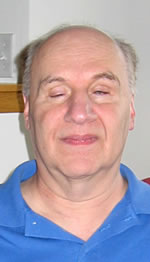Neal Ewers has been totally blind since birth. Since graduating from college, he has worked at the Library of Congress, been a concert pianist, directed a telephone crisis intervention service, and ran a non-profit organization called Inner-Vision, which worked to help sighted people learn to use their non-visual senses.
In 1992, Neal was hired by the Trace Research and Development Center; a pioneer in the field of technology and disability since 1971. At Trace, Neal worked directly with computer companies and other information technology companies, to integrate disability access features into their standard, mass-marketed products. Neal was a member of the team that authored computer accessibility guidelines which have been adopted by computer companies such as Microsoft. He was also part of the team that wrote the first Internet accessibility guidelines, now a part of the W3C’s Web Accessibility Initiative (WAI). He is a co-producer and narrator of a number of videos on accessibility including: “Introduction to the Screen Reader,” “Designing More Usable Web Sites,” Screen Magnification and the Web,” and “Listening to Learn.” All are available at http://www.doit.wisc.edu/accessibility/video/.
As someone who has been blind from birth, he is a key resource on the national scene having amassed knowledge of both the problems and the needs of persons with blindness, low vision, physical impairments, cognitive impairments, and learning disabilities. As he says, “We used to think that persons with particular disabilities had special needs that could only be accommodated by assistive technology specifically designed to meet the unique needs of each disability population. We now know that it is only by designing products and information that are accessible to all, that we will ever be able to offer everyone the technology they need to live effective, productive lives. We also know that many of the solutions first thought to be helpful to persons with disabilities also have far reaching implications for increasing the potential of persons who do not consider themselves disabled.”
In 2006, Neal retired from the Trace Center in order to devote his time to cross-disability solutions that would work for all persons with and without disabilities. He serves on a number of committees and task forces and is a consultant to a number of companies who produce assistive technology and others who produce main stream products.
Neal also owns a recording company and has several of his own music CDs on the market. In addition, he spends much of his time volunteering for HospiceCare, Inc. (Madison, Wisconsin) where he is currently team teaching a class called “Lifetime Legacies: Life Review with Hospice Patients.”


 Just Ask: Integrating Accessibility Throughout Design
Just Ask: Integrating Accessibility Throughout Design